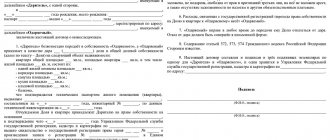People who are engaged in agricultural activities sooner or later begin to wonder how to further develop their business, while registering it in accordance with the law. Often the two most popular forms are individual entrepreneurs and peasant farms. Few people can boast of knowing how one concept differs from another. However, when choosing and registering a status, it is necessary to understand the intricacies and find out what is better - an individual entrepreneur or a peasant farm.
What is IP
IP – individual entrepreneur – an individual who is granted the right to carry out commercial activities.
Advantages of IP
The advantages of the form of individual entrepreneurship include the following points:
- a simpler registration and termination system;
- maintaining accounting records and submitting reports is not mandatory;
- some administrative fines are significantly lower;
- a legal address is not required for registration;
- registration costs are minimal;
- profit is the property of the entrepreneur;
- wide choice of taxation systems.
Disadvantages of IP
Now let's look at the cons:
- response to obligations with all owned property;
- the need to pay insurance premiums even in the absence of activity;
- some types of activities for individual entrepreneurs are prohibited;
- restrictions in terms of attracting financing;
- inability to sell the business.
What is a peasant farm?
A peasant farm (peasant farm) is a group of people who are related to each other. This gives them the opportunity to jointly implement agricultural activities. The founder of a peasant farm is considered to be one individual, the rest are in a contractual relationship, but they all have equal rights.
Advantages of peasant farms
Among the strengths of this form of business organization:
- availability of benefits for registration and tax calculation;
- availability of government business support programs;
- a wide range of activities: gardening, floriculture, viticulture, animal husbandry, poultry farming, beekeeping and others;
- a good option for a family business.
Disadvantages of peasant farms
Vulnerable points include:
- significant costs of creating a business (land and special equipment);
- inability to postpone the performance of one’s duties for some time;
- the likelihood that the business will not immediately generate income;
- It is not always possible to sell products at a favorable price;
- The success of a business also depends on natural factors.
Accounting Basics
Accounting in an agricultural organization is built around material assets and turnover. Accountants record in reports how much materials were received and how much was used. Most of it is occupied by estimating the cost of goods, calculating production and sales costs. The reporting also records the loss of agricultural products, livestock or raw materials due to natural causes.
All information is reflected in quantitative units of measurement. Accounting in livestock farming, crop production and processing has its own nuances.
Features of individual entrepreneur registration
Registration of individual entrepreneurs takes place at the place of residence of the individual. An alternative option is registration with the tax service, taking into account temporary registration. If approved, all data is entered into the general register of individual entrepreneurs.
Here are the stages a future entrepreneur goes through to register his business:
- Preparation of the necessary set of information (type of activity and OKVED code) and documents (copy of passport, application for registration as an individual entrepreneur, receipt confirming payment of the state duty).
- Submission of papers to the registration authority.
- If successful, you will receive a USRIP entry sheet.
- Registration of individual entrepreneurs with extra-budgetary state funds.
- Obtaining state statistics codes.
- Making a seal (if necessary).
Required documents
You will need to submit to the tax office:
- application for state registration of an individual as an individual entrepreneur;
- receipt of payment of state duty;
- application for transition to a simplified taxation system;
- copy of passport.
Peculiarities of peasant farm registration
Registration of a peasant (farm) enterprise takes place with the tax authorities at the place of residence. Usually the activities are organized there.
An adult capable citizen who does not have citizenship or whose citizenship is not Russian can also register a peasant farm.
The activities of peasant farms should not be tied to a specific location. Therefore, there are many ideas regarding business options.
Necessary documents for registration of peasant farms
The list of documents includes:
- registration application;
- agreement on the establishment of a peasant farm (needed only if the number of participants in the farm is more than one person);
- receipt of payment of state duty;
- application for transition to a special tax regime;
- a copy of the passport of the head of the household;
- copies of documents that confirm the presence of family ties between members of the household;
- list of selected OKVED codes.
Number of members and related rules
Members of a peasant farm can be spouses, children, brothers or sisters, fathers and mothers, and even more distant relatives who have reached the age of sixteen; The number of related members of a household is not limited by law. But: one household can have no more than three families.
A peasant farm can even accept people with whom its members have no family ties, but there should be no more than five of them.
General information
A peasant farm is an association of individuals connected by family ties or other common properties. A characteristic feature of a peasant farm is the ownership of joint property, as well as the management of farming and work in the production sector.
Persons with Russian citizenship have the right to register a farm. Foreign citizens have a similar right. The founder runs a joint venture with other participants or independently.
Among them:
- Wives, husbands;
- Parents;
- Sister, brother, their spouses;
- Persons who are not related to the founder (maximum – 5 people).
A peasant farm is created on the basis of a written agreement concluded between the founder and the other participants. An enterprise can be formed by one citizen when no other persons are involved. In this case, agreement is not necessary.
Who can create a peasant farm
You can create a peasant farm with or without parallel assignment of the status of a legal entity (at the moment this is the only way), as an individual entrepreneur or a private household plot.
Legal entity peasant farm
The new edition of the Federal Law “On Peasant Farming Enterprises” dated June 11, 2003 N 74-F3 does not provide for the possibility of registering a farm with the status of a legal entity. However, a peasant farm that acquired legal status in accordance with a similar law in 1990 retains it until January 1, 2021.
Registration of a peasant farm without creating a legal entity takes place at the tax office at the place of registration (including temporary) of its head. For this registration, the same rules apply as for a similar procedure for individual entrepreneurs. Registration must be completed no more than five working days in advance.
Individual entrepreneur - head of peasant farm
In accordance with Art. 23 of the Civil Code of the Russian Federation, the head of a peasant farm may be called an individual entrepreneur. In this case, he acts as both an entrepreneur and a representative of the economy, who acts on behalf of all its members. This obliges him to submit documentation to control authorities for both statuses.
It is noteworthy that some sources deny the possibility of registering a peasant farm with the current status of an individual entrepreneur. But you need to rely solely on the law, which is often updated, and this must also be taken into account.
Private household plot or peasant farm
Private household plot - personal subsidiary plot; This is a form of non-entrepreneurial economic activity that anyone can carry out if they have a personal plot. Private household plots do not require registration at the state level, do not provide for membership, and are exempt from taxes and reporting.
Citizens can begin working in this status immediately after registering rights to a land plot that is provided for private household plots. It should be noted that this form is intended to meet the personal needs of those who manage the household. That is, it is not aimed at making a profit.
Hence there are many disadvantages of private household plots. For example, there is a restriction on the permissible area of a land plot that is provided for use. In addition, a lot of borrowed money will not be given for the development of this business and it is impossible to issue declarations or certificates of conformity for it, which significantly limits the circle of potential buyers. This is due to the fact that private household plots are run not by a farmer-entrepreneur, but by an individual - independently or together with family members - and produces products not for sale, but for their own consumption.
Peasant farming is the choice of the farmer who plans to develop his business. The head of a private peasant farm has significant advantages over private household plots:
- more than 2.5 hectares of land for legal use;
- receiving large amounts of government support;
- the possibility of official cooperation in the sale of products with many categories of buyers;
- obtaining large amounts of borrowed funds from banks;
- the ability to create new jobs and attract workers legally;
- availability of tax benefits.
The choice between private household plots and peasant farms is based on determining the purpose of creating the farm.
Accounting specifics
If a farming company operates under the simplified tax system or unified agricultural tax, then there is no need to include summary information on the property in the reporting. With the general system, the accountant prepares a similar statement for submission to the Federal Tax Service.
To record property assets, special accounting forms are used. These documents record information on the company's tangible and intangible assets. Data on the number of working livestock, fattening animals, and products are entered into the accounting books.
Intangible assets (IMA) are also taken into account. The cost of intangible assets is calculated using the same methodology as fixed assets. Such assets include innovative developments for the field, breeding patents for plant varieties, copyrights, and permits for the exploitation of natural resources. Intangible assets are depreciation expenses, the period of their validity depends on the period of expectation of income.
The accountant also prepares personnel reports for hired specialists. Employees are hired according to the Labor Code of the Russian Federation. To calculate salaries and bonuses, primary documents are used - production sheets, waybills, work orders, registers.
Individual entrepreneurs and legal entities can hire workers. In this case, primary data on employees and their work activities is introduced into accounting:
- timesheets for recording work shifts and time;
- work orders for piecework work;
- waybills for transport;
- accounting statements and registers;
- documentation for calculation and issuance of salary.
Cash paid to employees is taxable. The farming company has the right to withhold contributions for payment to the treasury of the Russian Federation.
Peasant farm accounting
Peasant farms, like other types of economic activities, require accounting. This must be done in such a way that the regulatory authorities are provided with the necessary information regarding the property status, expenses, income and financial results of farmers. However, in this case the situation becomes more complicated due to the uncertainty of the legal status of the farm. Therefore, the organization of accounting in a peasant farm is related to its organizational form, as well as the management structure and size of production. This point needs to be clarified.
To ensure accurate accounting in a peasant farm, you can hire a specialist accountant who can act as a chief accountant, freelancer, or full-time employee of the farm.
All reports can also be made by the head of the peasant farm.
As a rule, it is said that the head of the peasant farm needs to keep records of materials and goods in accordance with the type of organization of agriculture, animals and poultry, costs of maintaining and operating equipment, repairs and maintenance, rent, expenses and income, etc. You also need to generate standard accounting reports for product sales.
Registration as a legal entity
The possibility of registration as a legal entity is not provided for by current law. The founder must register an individual entrepreneur and submit reporting documents independently.
A legal entity is registered only in one case - when the organization does not meet the criteria of a peasant farm. Provided that the farm is run with a large number of partners, and they are not a relative of the founder, then it is impossible to register the farm. In this situation, an LLC is registered, which will allow it to conduct activities in accordance with regulatory requirements.
State support for peasant farms
The state provides support in the creation and development of a lending system for agricultural producers and ensures equal rights in access to loans for business development.
The state provides property support to peasant farms on the basis of the federal law regulating the development of small businesses: a farm can receive for use state or municipal property in the form of plots of land, buildings, buildings, non-residential premises, equipment, vehicles, special equipment, etc. Help can provided under different conditions: free of charge, in consideration or as benefits.
Main advantages
A number of advantages distinguish peasant farms from other legal forms. Therefore, this way of doing business is in demand among entrepreneurs.
Main advantages:
- Tax benefits;
- Governmental support;
- Unlimited land area;
- Possibility of sponsorship from funds;
- Favorable conditions for obtaining loans;
- Lack of regular inspections (subject to compliance with the law).
Peasant farms are most often opened by citizens who permanently reside in rural areas and have knowledge and experience in agricultural work.
Recommendations for creating a successful peasant farm
Entrepreneurs with experience consider the following points important in creating their own agricultural business:
- It is better to purchase your own plot of land, even if it is far from home. This is an additional security measure.
- If the capital is small, then it is better to start with vegetable growing. In a few years, this area will bring significant income.
- If you have significant start-up capital, it is better to start a business with animal breeding. Pig farming is one of the most profitable options.
- It is necessary to use additional labor, since it is usually difficult to cope with the existing volume of work alone. Employees are a great option.
- It is necessary to sell manufactured products correctly and in full: you need to enter into agreements with wholesale buyers, markets and supermarkets.
Comparing individual entrepreneurs and peasant farms
To summarize all of the above and answer the main question stated in the topic, a table of differences will be useful: which is better, a peasant farm or an individual entrepreneur, can be decided by considering the characteristics compared in it.
| Differences | ||
| Aspects | peasant farm | IP |
| Number of members | Unlimited number of related participants | One individual |
| Registration | Elected head of the household | One individual |
| Responsibility | Subsidiary | An individual is liable for the obligations of the business with all his property |
| Reporting | Provided | Not necessary |
Recently, there has been a tendency for entrepreneurs to register peasant farms instead of individual entrepreneurs. This is especially true for those areas in which the authorities are actively implementing measures to develop the agricultural sector. These are, for example, the Voronezh and Rostov regions.
Thus, the choice between peasant farms and individual entrepreneurs lies directly with those who plan to open their own business. And the future entrepreneur needs to proceed from his own tasks and goals.









